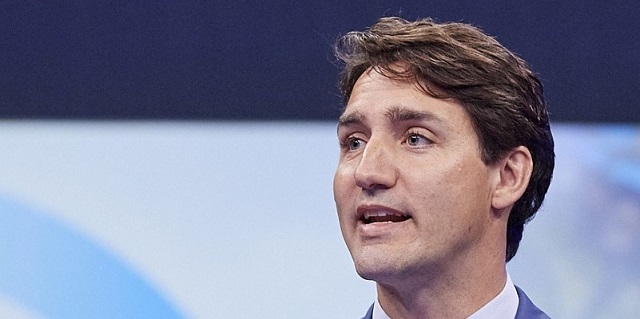Business
Federal government should change course in upcoming budget to revitalize economy

From the Fraser Institute
By Jake Fuss and Grady Munro
From 2020 to 2030, Canada is projected to record the slowest rate of per-person GDP growth among 38 developed countries in the OECD. Simply put, Canada’s economy is stalling relative to its own past performance and other comparable countries around the world.
The Trudeau government will table its next budget on April 16, and it must address Canada’s stagnant economy. While the economy won’t turn around overnight, the government should recognize that its current policy approach isn’t working.
According to a recent Leger poll, nearly two-thirds of Canadians have a “poor” or “very poor” view of Canada’s economy. And it’s no wonder they feel this way. Canada is experiencing an economic growth crisis. From 2013 to 2022, inflation-adjusted per-person GDP (a broad measure of living standards) grew at its slowest pace since the Great Depression in the 1930s. Since the Trudeau government took office in 2015, per-person GDP (inflation-adjusted) in Canada has grown by only 1.9 per cent—nearly one-eighth the growth rate in the United States over that same period.
Moreover, from 2020 to 2030, Canada is projected to record the slowest rate of per-person GDP growth among 38 developed countries in the OECD. Simply put, Canada’s economy is stalling relative to its own past performance and other comparable countries around the world.
Why?
While there are many reasons for this slump in economic activity, consider the collapse of business investment in Canada. From 2014 to 2021, business investment per worker (excluding residential construction) fell from C$18,363 to C$14,687. In contrast, during that same period, business investment per worker in the United States grew from C$23,333 to C$26,751. In other words, Canada experienced the equivalent of a $43.7 billion decline in annual business investment while the U.S. enjoyed a C$585.1 billion increase (all figures adjusted for inflation).
Business investment is crucial for economic growth (and subsequent increased living standards) because it provides the resources needed to equip workers with tools and technology, for businesses to expand operations and become more productive, and for new businesses to enter the market. This in turn fuels innovation and productivity, which are key determinants of living standards.
Which brings us back to the Trudeau government. The collapse of business investment in Canada has been due in part to recent federal policy including Bill C-69, which introduced new and costly assessment criteria for energy projects, Bill C-48, which restricts tanker traffic off British Columbia’s north coast, and the forthcoming emissions cap on oil and gas, which will increase the cost of doing business in Canada.
Clearly, Ottawa has thrown up stiff regulatory barriers that deter investment in Canada’s energy and mining sectors. According to a 2023 survey of oil and gas executives, more than two-thirds of respondents viewed Canada’s regulatory environment as a deterrent to investment. And on the fiscal front, a string of deficits and massive debt accumulation create uncertainty around future tax increases, which gives investors another reason to take their money elsewhere.
Finally, the Trudeau government also believes that government should play an active role in the economy by handing out corporate welfare and subsidies to favoured industries and firms (i.e. electric vehicle battery industry). But when government tries to pick winners and losers in the market, it may actually inhibit rather than help the economy. Instead, the government should leave decisions in the free market to the investors, businessowners and entrepreneurs who have firsthand knowledge of their industries and businesses.
The Trudeau government has done little to promote economic growth and raise living standards for Canadians. While it will take time to turn things around, in its upcoming budget the government should finally change course and help revitalize the Canadian economy.
Authors:
Business
Canada is failing dismally at our climate goals. We’re also ruining our economy.

From the Fraser Institute
By Annika Segelhorst and Elmira Aliakbari
Short-term climate pledges simply chase deadlines, not results
The annual meeting of the United Nations Conference of the Parties, or COP, which is dedicated to implementing international action on climate change, is now underway in Brazil. Like other signatories to the Paris Agreement, Canada is required to provide a progress update on our pledge to reduce greenhouse gas (GHG) emissions by 40 to 45 per cent below 2005 levels by 2030. After decades of massive government spending and heavy-handed regulations aimed at decarbonizing our economy, we’re far from achieving that goal. It’s time for Canada to move past arbitrary short-term goals and deadlines, and instead focus on more effective ways to support climate objectives.
Since signing the Paris Agreement in 2015, the federal government has introduced dozens of measures intended to reduce Canada’s carbon emissions, including more than $150 billion in “green economy” spending, the national carbon tax, the arbitrary cap on emissions imposed exclusively on the oil and gas sector, stronger energy efficiency requirements for buildings and automobiles, electric vehicle mandates, and stricter methane regulations for the oil and gas industry.
Recent estimates show that achieving the federal government’s target will impose significant costs on Canadians, including 164,000 job losses and a reduction in economic output of 6.2 per cent by 2030 (compared to a scenario where we don’t have these measures in place). For Canadian workers, this means losing $6,700 (each, on average) annually by 2030.
Yet even with all these costly measures, Canada will only achieve 57 per cent of its goal for emissions reductions. Several studies have already confirmed that Canada, despite massive green spending and heavy-handed regulations to decarbonize the economy over the past decade, remains off track to meet its 2030 emission reduction target.
And even if Canada somehow met its costly and stringent emission reduction target, the impact on the Earth’s climate would be minimal. Canada accounts for less than 2 per cent of global emissions, and that share is projected to fall as developing countries consume increasing quantities of energy to support rising living standards. In 2025, according to the International Energy Agency (IEA), emerging and developing economies are driving 80 per cent of the growth in global energy demand. Further, IEA projects that fossil fuels will remain foundational to the global energy mix for decades, especially in developing economies. This means that even if Canada were to aggressively pursue short-term emission reductions and all the economic costs it would imposes on Canadians, the overall climate results would be negligible.
Rather than focusing on arbitrary deadline-contingent pledges to reduce Canadian emissions, we should shift our focus to think about how we can lower global GHG emissions. A recent study showed that doubling Canada’s production of liquefied natural gas and exporting to Asia to displace an equivalent amount of coal could lower global GHG emissions by about 1.7 per cent or about 630 million tonnes of GHG emissions. For reference, that’s the equivalent to nearly 90 per cent of Canada’s annual GHG emissions. This type of approach reflects Canada’s existing strength as an energy producer and would address the fastest-growing sources of emissions, namely developing countries.
As the 2030 deadline grows closer, even top climate advocates are starting to emphasize a more pragmatic approach to climate action. In a recent memo, Bill Gates warned that unfounded climate pessimism “is causing much of the climate community to focus too much on near-term emissions goals, and it’s diverting resources from the most effective things we should be doing to improve life in a warming world.” Even within the federal ministry of Environment and Climate Change, the tone is shifting. Despite the 2030 emissions goal having been a hallmark of Canadian climate policy in recent years, in a recent interview, Minister Julie Dabrusin declined to affirm that the 2030 targets remain feasible.
Instead of scrambling to satisfy short-term national emissions limits, governments in Canada should prioritize strategies that will reduce global emissions where they’re growing the fastest.

Elmira Aliakbari
Artificial Intelligence
Lawsuit Claims Google Secretly Used Gemini AI to Scan Private Gmail and Chat Data

Whether the claims are true or not, privacy in Google’s universe has long been less a right than a nostalgic illusion.
|
When Google flipped a digital switch in October 2025, few users noticed anything unusual.
Gmail loaded as usual, Chat messages zipped across screens, and Meet calls continued without interruption.
Yet, according to a new class action lawsuit, something significant had changed beneath the surface.
We obtained a copy of the lawsuit for you here.
Plaintiffs claim that Google silently activated its artificial intelligence system, Gemini, across its communication platforms, turning private conversations into raw material for machine analysis.
The lawsuit, filed by Thomas Thele and Melo Porter, describes a scenario that reads like a breach of trust.
It accuses Google of enabling Gemini to “access and exploit the entire recorded history of its users’ private communications, including literally every email and attachment sent and received.”
The filing argues that the company’s conduct “violates its users’ reasonable expectations of privacy.”
Until early October, Gemini’s data processing was supposedly available only to those who opted in.
Then, the plaintiffs claim, Google “turned it on for everyone by default,” allowing the system to mine the contents of emails, attachments, and conversations across Gmail, Chat, and Meet.
The complaint points to a particular line in Google’s settings, “When you turn this setting on, you agree,” as misleading, since the feature “had already been switched on.”
This, according to the filing, represents a deliberate misdirection designed to create the illusion of consent where none existed.
There is a certain irony woven through the outrage. For all the noise about privacy, most users long ago accepted the quiet trade that powers Google’s empire.
They search, share, and store their digital lives inside Google’s ecosystem, knowing the company thrives on data.
The lawsuit may sound shocking, but for many, it simply exposes what has been implicit all along: if you live in Google’s world, privacy has already been priced into the convenience.
Thele warns that Gemini’s access could expose “financial information and records, employment information and records, religious affiliations and activities, political affiliations and activities, medical care and records, the identities of his family, friends, and other contacts, social habits and activities, eating habits, shopping habits, exercise habits, [and] the extent to which he is involved in the activities of his children.”
In other words, the system’s reach, if the allegations prove true, could extend into nearly every aspect of a user’s personal life.
The plaintiffs argue that Gemini’s analytical capabilities allow Google to “cross-reference and conduct unlimited analysis toward unmerited, improper, and monetizable insights” about users’ private relationships and behaviors.
The complaint brands the company’s actions as “deceptive and unethical,” claiming Google “surreptitiously turned on this AI tracking ‘feature’ without informing or obtaining the consent of Plaintiffs and Class Members.” Such conduct, it says, is “highly offensive” and “defies social norms.”
The case invokes a formidable set of statutes, including the California Invasion of Privacy Act, the California Computer Data Access and Fraud Act, the Stored Communications Act, and California’s constitutional right to privacy.
Google is yet to comment on the filing.
|
|
|
|
Reclaim The Net is reader-supported. Consider becoming a paid subscriber.
|
|
|
|
-

 Energy2 days ago
Energy2 days agoCarney bets on LNG, Alberta doubles down on oil
-

 Alberta2 days ago
Alberta2 days agoAlberta on right path to better health care
-

 Indigenous2 days ago
Indigenous2 days agoTop constitutional lawyer slams Indigenous land ruling as threat to Canadian property rights
-

 Alberta2 days ago
Alberta2 days agoAlberta Emergency Alert test – Wednesday at 1:55 PM
-

 Alberta2 days ago
Alberta2 days agoCarney government’s anti-oil sentiment no longer in doubt
-

 Alberta1 day ago
Alberta1 day ago‘Weird and wonderful’ wells are boosting oil production in Alberta and Saskatchewan
-

 Health2 days ago
Health2 days agoSPARC Kindness Tree: A Growing Tradition in Capstone
-

 Business1 day ago
Business1 day agoCanada is failing dismally at our climate goals. We’re also ruining our economy.










